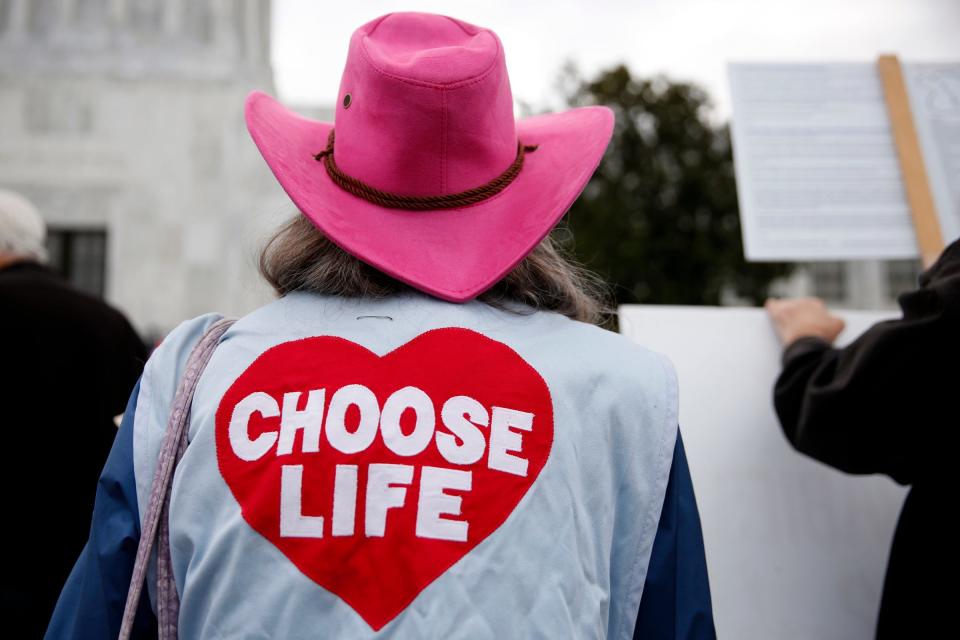March for Life returns to Oregon Capitol as activists await Supreme Court decision
Abortion is not expected to be a top issue at the Oregon Legislature this session. But as the Oregon March for Life returns to the Oregon Capitol Saturday, activists on both sides are awaiting a U.S. Supreme Court decision that could have a significant impact nationwide.
Organizers with Oregon Right to Life expect about 2,000 people to attend the rally in Salem. The city will close Court Street to vehicle traffic starting at 10 a.m., as well as Cottage Street and one lane of Center Street at about 2:30 p.m. All streets are expected to be reopened by 5 p.m.
The rally begins at 2 p.m., with the march itself scheduled for 3:30 p.m. Religious and political leaders will be among the speakers.
“The primary focus is to honor and acknowledge the lives that have been lost due to legal abortion,” Oregon Right to Life executive director Lois Anderson said. “It’s also to stand together and commit together to our cause.”
Case before the Supreme Court
The Supreme Court case in question deals with Mississippi and its ban on most abortions after 15 weeks of pregnancy.
The high court heard the case in December, and long-time observers say a majority of the justices seemed poised to uphold the abortion ban, though perhaps fewer are willing to completely undo Roe v. Wade.
Abortion rights advocates say allowing Mississippi's 15-week ban to take effect would, in practice, overturn Roe by wiping away one of its central holdings: that people have a right to an abortion until viability, the point when a fetus can survive outside the womb or about 24 weeks into a pregnancy.
Abortion ruling impact: Why Oregon is insulated from looming US Supreme Court abortion decision
At least 17 states enacted "trigger bans" or have pre-Roe abortion bans in place in the event the Supreme Court overturns the ruling, according to the Guttmacher Institute, a research group that supports abortion rights.
Oregon is not among these states, and has passed laws securing access to abortions independent of what happens at the federal level.

While legal protections would remain, that does not mean Oregonians are entirely insulated from a ruling. For example, it is easier for some who lives in eastern Oregon to get an abortion in Boise, Idaho, because it is closer than Bend. Those people would have their access impacted, as Idaho is one of the states with a trigger ban.
More people from Idaho are also expected to seek abortions in Oregon if the ban goes into effect, creating more demand for those services here.
Proposed Oregon legislation
Three bills that mention abortion or reproductive rights have been introduced for the 2022 Oregon legislative session, which begins Tuesday.
Two of those bills are from Republicans, which Anderson acknowledged are unlikely to receive even initial hearings in the Democrat-controlled Legislature. The third is an omnibus bill with technical fixes within health care.
Senate Bill 1553 is a re-introduction of a bill from a previous session that would require babies born alive despite an attempted abortion receive certain medical and legal protections.
Proponents say the bill would afford needed protections, while opponents say situations where this bill would be needed are vanishingly rare — and moreover, the bill is unnecessary because infanticide is already illegal.
Rental help: Oregon renters can apply for assistance once again
House Bill 4042 would require informed consent at least 24 hours prior to a planned chemical abortion about the option of reversing the procedure. The reversal is performed by taking a drug between the first and second pill of a two-pill medication abortion series.
A handful of other states have passed similar bills, though medical and research groups say scientific evidence does not support the assertion that chemical abortions can be "reversed," and safety risks are unstudied.
Anderson said the Supreme Court decision won't change her organization's focus of identifying and introducing anti-abortion legislation, as well as backing anti-abortion candidates for the state Legislature and for governor.
“We’re all anticipating it will be a major decision; there will be a major shift in what we can do as individual voters and our legislators at the state level to limit abortion," Anderson said.
Oregonians have largely shown their support for abortion rights and access. In 2018, voters shot down a ballot measure by a 2-to-1 margin that would have prohibited public funds from being spent on abortions.
An Do, executive director of Planned Parenthood Advocates of Oregon, said that while the state has strong protections in place, there are still Oregonians who are experiencing barriers to abortion access.
The state needs to push for even greater access, Do said, in addition to pushing back against attempts to limit access.
“Folks are always trying to chip away at the edges,” Do said. "There are a lot of ways to introduce bills that attack abortion rights without an outright ban."
But if the Supreme Court undoes some or all federal abortion access protections, those attacks could turn into "full-frontal assaults," Do said.
USA Today contributed to this article.
Reporter Connor Radnovich covers the Oregon Legislature and state government. Contact him at cradnovich@statesmanjournal.com or 503-399-6864, or follow him on Twitter at @CDRadnovich.
Support local journalism by subscribing to the Statesman Journal.
This article originally appeared on Salem Statesman Journal: Oregon's March for Life returns as SCOTUS verdict looms

